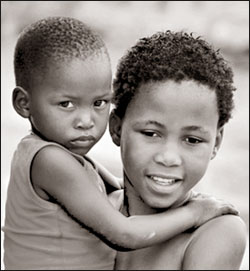Poor children face life’s struggles with strong will
In some corners of the world, some children are
enjoying their heavenly life, while others are suffering bitterness. But
a strong will lightens the load of those suffering children and gives
them hope
With tears gushing from his eyes, which are irritated by cooking
smoke, Denis Opoka keeps mixing maize flour in a saucepan while his
younger sister and brother are waiting quietly.
|

Ugandan village children have to work hard for survival.
Courtesy: Google |
Opoka, 14, has been running the family in a remote Ugandan village
for several years after their parents were killed by a notorious Ugandan
rebel group.
Living in a mud hut, Opoka always tried to come up with a way to keep
his nine-year-old sister Innocent Apio and 12-year-old brother Samuel
Onen fed and educated.
They dug up several small patches of farmland around the hut,
planting maize, sweet potatoes and beans. The harvest, however, could
barely sustain them after drought ruined the first season’s crops
earlier this year.
From time to time, Opoka works in the neighbour’s garden in exchange
for a little money to buy soap, candles or salt. Opoka has to walk
barefoot 5 km to Omoti Hill Primary School every morning. He is sitting
in Primary Seven, for the second year, after he failed to raise about
150,000 Ugandan shillings (about 85 U.S. dollars) for Senior One,
although he passed the exams with a grade average of B.
His siblings are luckier: they are being educated at a nearby school,
only five minutes’ walk from their home. Only when the sun starts
setting can Opoka and his family get together again as they cook and eat
supper. After that, the older brother sometimes corrects Apio’s and
Onen’s homework and exam papers. A paraffin lamp, the only thing that
can extend their study time after sunset, was stolen recently, leaving
them depending on candles borrowed from a neighbour.
At night, Opoka and his brother share a blanket, which doubles as a
cover and a mat, while Apio uses a torn bed sheet.
Opoka hopes to join a vocational technical institute “so that I can
get a job to pay school fees for my brother and sister.”
In Cairo, in a bustling street, a driver stopped his car to buy
cigarettes.
A boy rushed to wipe the car skillfully, while nimbly dodging other
cars racing past, his hands running a dust cloth from the window to the
door.
He was paid 0.25 Egyptian pounds (0.05 U.S. dollars). This sum can
buy almost nothing in Egypt. “It’s better than nothing,” Ahmad said with
a smile.
Ahmad, a six-grade boy, spent all his time outside of class on the
streets earning some pocket money for his mother, who has been the
backbone of the family with four children since their father died of
illness last year. Ahmed, 12, never visited Cairo’s world-renowned
pyramid across the Nile River.
Poverty kept him from crossing the river, but could not hold him back
from dreaming to be a doctor. “I wish to be a doctor, and I can cure the
diseases of my family members and the poor people,” the boy declared.
Compared with Opoka and Ahmed, Josyane Quemajoux is fortunate since
both of her parents are still alive. Nevertheless, the Cameroon girl
cannot lead a life of leisure.
Her father had been a taxi driver before his car broke down two years
ago. Now he is jobless.
The 11-year-old girl, together with her mother, are the family’s only
breadwinners. Each afternoon after class, Josyane hurries to the Mokolo
market in the capital city of Yaounde, where her mother owns a fruit
stall.
Josyane stays there until dark while her mother goes back home to
take care of her younger siblings.
“A hundred CFA francs (0.2 dollars) for the large (orange), 60 for
the small,” Josyane told a customer while quickly picking up an orange
and then deftly peeling it. “Such a stall can bring us 1,000 francs
every day, almost the same with selling bananas, grilled fish can earn
more, but its cost is high; mom does not have so much money,” Josyane,
an astute little businesswoman, explained.
The West African girl assumes the responsibility for her family, but
has no future plans of her own. “Many of my classmates are just like me.
I don’t know what the life will be in the future.”
Xinhua |



